By Candace Kukino, Au.D., Director of Audiology at Hearing, Speech & Deafness Center (HSDC)
There is a new trend we will be seeing more and more of in the stores, newspapers, and advertisements: inexpensive personal sound amplification products being sold at your local drugstore. One of the reasons you'll see more ads and products focused on hearing amplification is because we are entering the retirement age of the huge
Baby Boomer population (people born between 1946-1964), many of whom are
not adequately prepared financially for retirement and who may be living longer but are
less healthy. These health problems are red flags for acquired hearing loss and/or tinnitus. Also, just as vision tends to change with age so can hearing. This is often a gradual change over a period of years, and often the person who is hard of hearing does not realize it.
We know that quality hearing aids have always been and continue to be expensive, ranging from a little less than $1000 to over $4000 each depending on the level of technology, services included in the cost, and location of the clinic. For example, we have a client who feels that the cost of traveling to Seattle from New York is a better value than being fit with hearing aids by an audiologist in Manhattan. She bases the value on the quality of hearing aid fitting, sound quality, our customer service, and overall satisfaction of care we provide here at HSDC versus her experiences in Manhattan.
So why not just save money and purchase your "hearing aids" at Walmart or Walgreen's? Because these Personal Sound Amplification Products (“PSAPs”) are NOT hearing aids. They are merely amplifiers. Both hearing aids and PSAPs contain a microphone, amplifier and speaker; beyond that, they are very different. The
FDA guidelines specifically say that PSAPs are “not intended to compensate for impaired hearing.” These are a few additional points about the difference outlined in a the FDA article “
Know the Difference”:
•
Only hearing aids are intended to make up for impaired hearing.
•
Buy a personal sound amplifier only after ruling out hearing loss as a reason for getting [a PSAP].
•
Choosing a PSAP as a substitute for a hearing aid can lead to more damage to your hearing
•
PSAPs are not intended to make up for impaired hearing. Instead, they are intended for non-hearing-impaired consumers to amplify sounds in the environment for a number of reasons, such as for recreational activities.
Basically, PSAPs take sound and amplify it, just like turning up the volume on your radio. Period. This is the equivalent of using a magnifying glass to see rather than getting your left and right eyes tested separately with clinical equipment, getting a prescription for eyeglass lenses or contacts by an optometrist, and being fitted with them by a trained optician. Even basic hearing aids are extremely sophisticated computers. They analyze and modify sound with the goal of reducing background or unwanted sounds and improving a person’s ability to understand what people are saying.
Now that you've got the facts, you’ll see why these sound amplifiers are not equivalent to hearing aids. If you know anyone who does have hearing aids and is not satisfied with the way they sound, encourage them to contact their audiologist for programming adjustments and make sure they are getting updated hearing tests at least every two years. This will ensure the hearing aids are programmed to their current hearing status. Everyone hears differently and lives in different sound environments. All hearing aids need to be programmed and re-programmed according to the individual.


.jpg)


